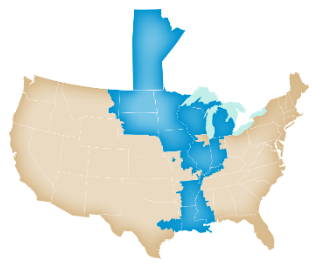MAXIMUM GENERATION WARNINGS
Eau Claire Energy Cooperative is committed to providing the most reliable and safe electric to our members as possible. In recent news, MISO has made it evident that there is an increased possibility of rolling black outs due to an unbalance in power generation at peak times and usage during those peak times. ECEC wants our members to be fully prepared for these possibilities. In this article you will find how to better understand the issue, what the unattractive reality of the situation may be, and what you should do to prepare and possibly prevent the potential of rolling blackouts going into the summer months.
- What is MISO?
- Why do we need to be vigilant now?
- What will happen if an ELR Plan is implemented?
- What do you need to know?
- Why can't we use more renewable energy to meet the missing demand?
What is MISO?
Midcontinent Independent System Operator (MISO) is a wholesale electric market that encompasses all or parts of 15 states and Manitoba, Canada. Their purpose is to regulate the market for wholesale electricity. This creates safety standards and regulates the price of wholesale power. Dariyland Power Cooperative, ECEC’s generation and transmission supplier, generates electricity, sells it on the MISO Market, and then buys it back at a regulated price to distribute to its members, and bills members for their demand (the strain or draw on the power grid they service). During peak times, like a 90° day with air conditioning running, demand would be higher than usual.

Why do we need to be vigilant now?
MISO’s executive director stated, “MISO's northern and central region is at heightened risk for controlled ‘load sheds,’ or planned blackouts.” With the record heat expected this summer, the influx of new homes and properties, and the irregularity of renewable energy sources that have replaced more on-demand fossil fuel power generation, the demand is predicted to outweigh current generation of power. If the power grid is nearing capacity, members will be asked to begin to limit their consumption as much as possible. This may mean, turning down air conditioning, moving the use of dishwashers and washers and dryers to lower demand hours, and lessening the nonessential use of electricity as much as possible. Doing so will hopefully take some pressure off the grid to help keep the lights on and help avoid blackouts. If these measures are still not enough to offset a power shortage, it is possible that Dairyland Power Cooperative will request an emergency load reduction plan to be implemented.
What will happen if an Emergency Load Reduction Plan is implemented?
This plan is essentially a rolling blackout plan to decrease the load ECEC’s members put on Dairyland Power Cooperative. If the plan is enacted, Eau Claire Energy Cooperative crews will cycle rolling black outs throughout our service territory in sections determined by substation. Each cycle will be approximately one half-hour off followed by one hour back on. This process will repeat as necessary until the emergency load reduction order by Dairyland Power Cooperative has been lifted.
Large businesses with high power consumption will be notified to shut down operations through the entirety of the emergency load reduction order. If your business is required to shut down, someone from our office will contact you to let you know that an emergency load reduction plan has been put in place and that it will be required to shut off all electric service until the end of the notice.
What do you need do know?
If peak alerts do not resolve the demand issue and/or Dairyland Power Cooperative issues an emergency load reduction plan, Eau Claire Energy Cooperative will make every effort to keep our members in the loop about what to expect and when to expect it. In the event of rolling blackouts being a necessity, it will be an emergency event to prevent system wide power outages. We will do our best to let you be aware of the situation as it unfolds. Members or businesses who depend on electricity for oxygen or other life-sustaining medical equipment should have a plan in case of a power outage. Unfortunately, we are not able to exempt a member from this plan. Owning a backup generator can provide peace of mind in these situations. *
Before installing a backup generator, please contact our office to ensure your backup generator is installed correctly to protect the safety of our line crew.
Why can't we use more renewable energy to meet the missing demand?
Typically, with increases in demand, generation facilities like Dairyland Power Cooperative have been able to deploy a coal or natural gas fired plant to generate to offset the demand of power on the grid. With the increase in retirement of fossil fuel generation facilities and the increase in renewable energy, the MISO market does not have enough on-demand generation to make up the difference. If there were no demand times and power was used at consistent increments, the switch to renewable energy would be more effective to cover the lost fossil fuel generation. However, because energy is used more frequently at peak times of day and certain times of year, generation needs to meet need. We cannot force the wind to blow or the sun to shine in times of need and that is where the demand is not being met.